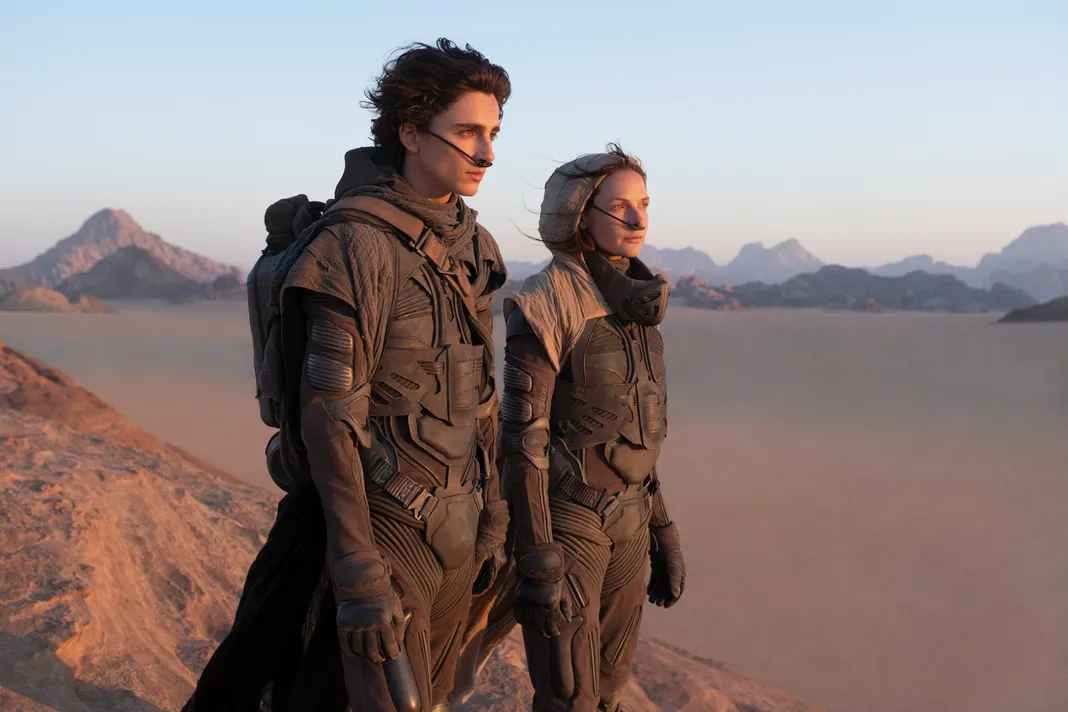Hey, Hollywooders! What’s Good in the ‘Wood?
I went on opening day, October 22, to see Dune, one of the many new movie releases out now in movie theaters. I took a look at theaters near me to compare movie showtimes and settled on going to the 11:30 a.m. showing at the Showcase Cinemas theater near me.
The auditorium was surprisingly busy for a Friday morning, but there were still plenty of seats to choose from and there was no line at the concession stand to buy movie theater popcorn and other snacks!
What is Dune about?
Before heading to the theater to see Dune, I knew virtually nothing about the film except that it was a science fiction movie starring some of Hollywood’s biggest actors. From the beginning of the movie, the story is very interesting and unlike anything I’ve watched before.
Dune takes place in the future in— the year 10191 to be exact— where interstellar travel is possible using “spice,” a substance that can only be found on the desert planet of Arrakis. The film is based on the 1965 novel of the same name by Frank Herbert, which was named one of the 100 most influential novels by BBC News in 2019.
Dune tells the tale of what happens when communities from different planets and backgrounds cross paths in their attempt to further their own political agendas. In Warner Bros.’ description of Dune, the studio writes: “As malevolent forces explode into conflict over the [Arrakis’] exclusive supply of the most precious resource in existence—a commodity capable of unlocking humanity’s greatest potential—only those who can conquer their fear will survive.”
In some ways, Dune is reminiscent of James Cameron’s Avatar in that visitors infiltrate a foreign planet in order to acquire something that’s beneficial to them without regard to the natives. The Fremen people in Dune reminded me a lot of Avatar’s Na’vi since they’re willing to work with these uninvited guests so long as they prove themselves and respect the land they’ve entered.
Filled with hushed conversations and secret communication, Dune keeps a mysterious tone throughout its runtime. While watching the film, I often felt that I never fully knew the background of what the characters were discussing or why they were performing certain actions. The end of the movie brought some clarity. However, it did leave the story very open-ended and indicated that we can most likely expect a sequel in the future.
Dune’s cast is packed with the biggest names in Hollywood
When I was sitting in the theater watching Dune, I could not get over how many big actors are in the film! The extensive cast includes Timothée Chalamet, Rebecca Ferguson, Oscar Isaac, Stellan Skarsgård, Dave Bautista, Zendaya, and Jason Momoa.
Though the film was ensemble-oriented, Timothée Chalamet gives an outstanding performance as Paul Atreides, a character who’s often the focal point of Dune. Paul is the son of Leto, the Duke of House Atreides. He is also the center of the film’s subplot, which explores the Bene Gesserit, a form of spirituality that allows Paul the ability to have dreams and visions that predict the future.
I found Timothée’s portrayal of Paul Atreides to provide most of the heart of the film, as his relationships with both those around him and his own abilities help to further Dune’s narrative. While I didn’t recognize her from any other projects I’ve seen, another standout actor for me is Sharon Duncan-Brewster who played the role of Dr. Liet-Kynes.
In the film, Dr. Liet-Kynes is a Planetologist who helps the people of House Atreides upon their arrival to Arrakis. When the time comes, Dr. Liet-Kynes engages in selfless acts in order to protect Paul and help him survive on the desert planet.
Music is one of Dune’s greatest assets
Aside from the film’s star-studded cast, the aspect of Dune that stuck out to me the most while watching it in theaters was the intricate score. The film’s music was composed by Oscar, Golden Globe, and Grammy-winning composer Hans Zimmer, who is known for his work on The Lion King and The Dark Knight.
The score kept Dune interesting and really helped to push the story during scenes that were lacking in dialogue. I thought there were some unique music choices as well. Sometimes the score simply consisted of instrumentals that you’d often hear in action films, while other times it included background vocals that helped to evoke emotion.
In an interview with The New York Times, Dune’s director Denis Villeneuve said, “Dune is by far my most musical film… The score is almost ubiquitous, participating directly in the narrative of the film. It’s spiritual.”
Dune is meant to be seen in theaters
Taking place in an other-worldly desert, Dune is full of stunning visuals. After seeing the film in theaters and re-watching some scenes at home on HBO Max, I’ve realized that seeing Dune in theaters is an experience that can’t be recreated when streaming it on your TV. The film’s vast landscapes come to life on the big screen, creating scenes that wouldn’t deliver on your TV set.
It should be noted that the film does run for 2 hours and 35 minutes so be prepared to sit back and relax for a while when you see it in theaters!
Want to know what others are saying about Dune? Check out the Best Reactions to Movies Out Now.
More Entertainment News Like This: Weekend Movie Releases
More Entertainment News Like This: Should You See ‘Venom: Let There Be Carnage’ In Theaters?
Hollywood.com is EVERYONE’S ticket to Hollywood. We focus on the GOOD in Hollywood, spotlighting the feel-good stories that matter about your favorite celebs plus new movies in theaters. Follow us on Instagram for early access.


